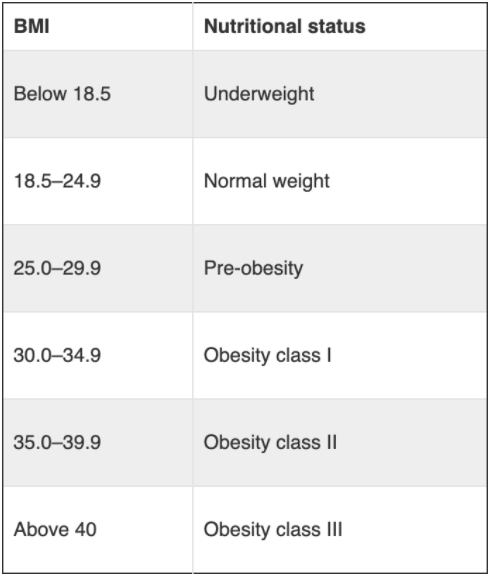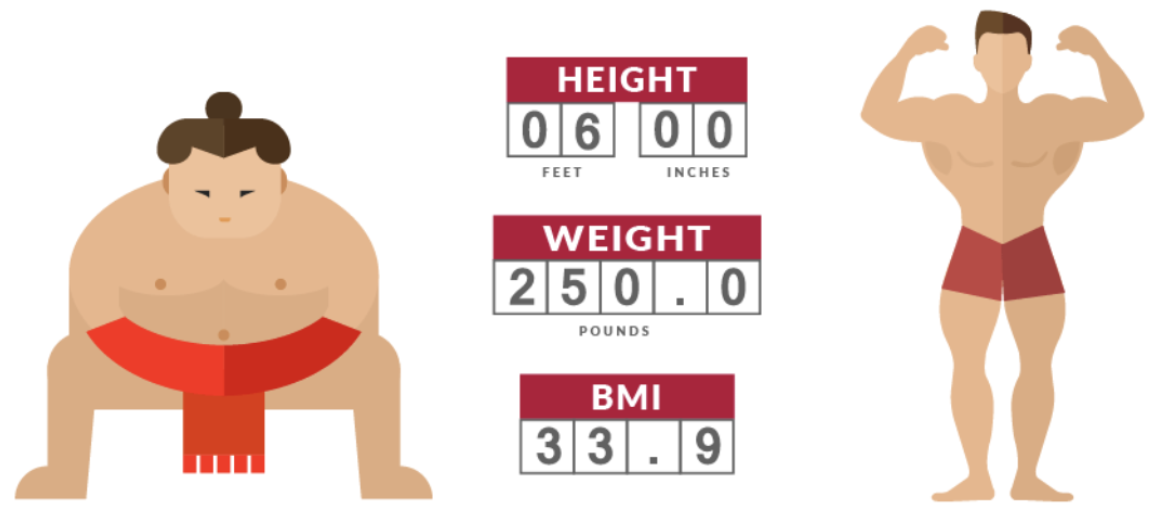Calculate your body mass index:
BMI calculator
What is Body Mass Index?
Body Mass Index (BMI) shows the ratio between a person’s body weight and height. This index is widely used as a general indicator of whether a person has a healthy body weight per height or not.
The World Health Organization (WHO) classifies results into 4 major weight categories: underweight, normal weight, pre-obesity, and obesity. In addition, peripheral areas of the BMI spectrum are further classified: Obesity class I, II, and III, or more commonly known as obese, severely obese, and morbidly obese.
BMI formula
You can easily calculate the body mass index using the BMI calculator at the top of the page, or calculate it yourself, by dividing your body mass by the square of your height:
EXAMPLE: A person is 175 cm tall and weighs 100 kg. In this case, the formula looks like this: BMI = 100 kg / 1.75 m² = 100 / 3.0625 = 32.65 kg / m²
With that result, the person falls into the “Obesity class I” category.
“Blind spots” of BMI
Although BMI is one of the most common indicators of healthy weight, it still has its weaknesses. The main concern with BMI is that only weight and height are taken into account in the calculation, although they are only “the tips of the iceberg”.
As people have different body types and the distribution of muscle, bone mass, and fat varies from person to person, in addition to BMI, other body tests, measurements, etc., such as body composition analysis, should be used to assess people’s physical condition.
For instance, the BMI of a 183 cm and 113 kg sumo wrestler and a bodybuilder can be precisely the same, which gives the impression of a bodybuilder being strongly overweight, although the athlete’s high weight is due to great muscle mass.
Being underweight or overweight can be very dangerous to health, so although body mass index isn’t an ideal indicator of healthy body weight, it is still a good indicator of whether further analysis or consultation should be considered.
There are slightly different nuances in the calculation of children’s body mass index compared to adults, because especially for children, their age, gender, etc. must be taken into account. You can read more about children’s BMI figures and charts on the World Health Organisation’s website.
How BMI still does its job?
Even though BMI can be misleading in terms of body types, it still gives you a good overview if there is room for improvement for your body or is everything already the way it should.
Here’s a perfect example of why body weight isn’t the best indicator of how healthy a person really is, but BMI, on the other hand, gives a clear grasp:
Especially in cases like shown in the picture, BMI is the right tool to assess your body condition.
Risks associated with obesity
Obesity is a significant public health concern associated with numerous health risks that can considerably affect a person’s quality of life and lifespan. It directly contributes to the development of multiple chronic conditions such as heart disease, diabetes, and certain types of cancer. These conditions are often due to increased blood pressure and cholesterol levels, which are common in people with obesity. Furthermore, obesity can lead to obstructive sleep apnea, a potentially serious sleep disorder where breathing repeatedly stops and starts.
Here are some specific risks associated with obesity:
- Cardiovascular diseases: Increased body weight can put more pressure on the heart, leading to conditions like hypertension (high blood pressure), heart attacks, and strokes.
- Type 2 diabetes: Obesity often leads to insulin resistance, a major cause of type 2 diabetes.
- Cancer: Obesity has been linked with an increased risk of developing various types of cancer, such as breast, colon, and kidney cancer.
- Osteoarthritis: The excess weight can put unnecessary strain on the joints, especially the knees, hips, and lower back, leading to osteoarthritis.
- Respiratory issues: Conditions like sleep apnea and asthma are more common in people with obesity due to increased fat in the neck area and inflammation in the lungs.
- Mental health issues: Obesity can lead to psychological problems like depression, anxiety, and low self-esteem due to societal stigma and body image issues.
- Gallbladder diseases: Obesity increases the likelihood of gallstones and gallbladder diseases.
- Fatty liver disease: This condition, which can lead to liver damage or even liver failure, is more prevalent in people with obesity.
- Reproductive issues: Obesity can also cause hormonal imbalances, leading to issues such as infertility, polycystic ovarian syndrome (PCOS), and complications during pregnancy.
Remember, these are potential risks, not guaranteed outcomes, and individual health can vary greatly. Moreover, it’s possible to manage these risks with lifestyle changes and medical intervention. Overall, the risks associated with obesity go beyond the physical, impacting psychological and social well-being, thus stressing the importance of maintaining healthy body weight.
Risks associated with being underweight
Being underweight can also pose numerous health risks, potentially affecting one’s overall quality of life and lifespan. While it might not be as frequently highlighted as obesity, being significantly below a healthy weight range can contribute to a variety of health issues, including but not limited to:
- Malnutrition: Not consuming enough nutrients can lead to malnutrition, which can have far-reaching effects on nearly every system in the body, leading to poor overall health.
- Weakened Immune System: Being underweight can lead to a weakened immune system, increasing susceptibility to infections and diseases.
- Bone Health Issues: Lack of nutrition, particularly calcium and vitamin D, can contribute to osteoporosis and fractures.
- Anemia: Underweight individuals are at a higher risk of suffering from anemia, a condition characterized by insufficient red blood cells or hemoglobin in the blood.
- Fertility Issues: Being underweight can cause hormonal imbalances, which can lead to irregular menstrual cycles, infertility, and complications during pregnancy in women.
- Growth and Development Issues: This is particularly a concern in children and teenagers who are underweight, as they may not develop properly due to nutritional deficiencies.
- Mental Health Issues: Just like with obesity, being underweight can lead to psychological problems such as depression, anxiety, and body image issues.
Again, these are potential risks and individual health can vary greatly. It’s essential to manage these risks through balanced nutrition, medical intervention, and healthy lifestyle choices. Being underweight, just like being overweight, can lead to various health issues, so maintaining a healthy weight is crucial for overall health and well-being.
The benefits of being in healthy weight
Maintaining a healthy weight not only ensures a good appearance but also increases your self-confidence, the efficiency in doing your daily activities, and, above all, keeps you away from health problems related to being underweight or overweight.
Points regarding the importance of maintaining a healthy weight:
- Reduced Risk of Chronic Diseases: Achieving and maintaining a healthy weight is crucial in reducing the risk of numerous chronic diseases such as heart disease, diabetes, and certain types of cancer.
- Efficient Body Regulation: At a healthy weight, your body can more efficiently regulate blood sugar and blood pressure, reducing strain on your heart and other vital organs.
- Adequate Nutrition: A healthy weight often indicates that you’re getting enough nutrients needed for your body’s daily functions, supporting everything from your immune function to your mental health.
- Improved Mobility and Energy Levels: Being within a healthy weight range can enhance your mobility and overall energy levels, contributing to a better quality of life.
- Reduced Risk of Sleep Apnea: A healthy weight reduces the risk of developing sleep apnea, a serious sleep disorder where breathing repeatedly stops and starts.
- Reduced Risk of Fertility Issues: Both underweight and overweight extremes can lead to fertility problems. A healthy weight promotes hormonal balance and reproductive health.
- Mental Health: Achieving a healthy weight can also improve mental health by boosting self-esteem and reducing the likelihood of conditions such as depression and anxiety.
Now that you know your BMI...
Once you have calculated your body mass index and seen what category it falls into, you need to take action based on the result. If your BMI remained within normal weight, you do not need to make any significant changes – just continue with your current lifestyle and diet, assuming it is healthy and sustainable.
However, if your BMI is in the range of underweight, overweight, or even obesity, you should definitely start off by consulting with a nutritionist. This will give you a good overview of your current state of health, and timely guidance from a specialist can help you alleviate or even prevent weight-related health problems.
In the case of overweight and obesity, in addition to booking a consultation appointment, you can also check out various weight loss surgeries, which have been life-changing journeys for hundreds of patients.
A remarkably easier and healthier life for you might be just around the corner!









